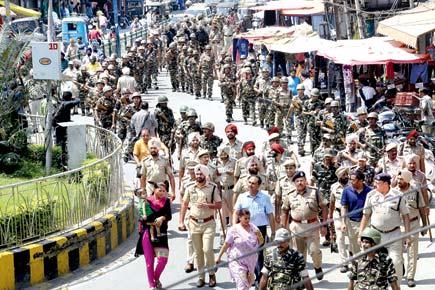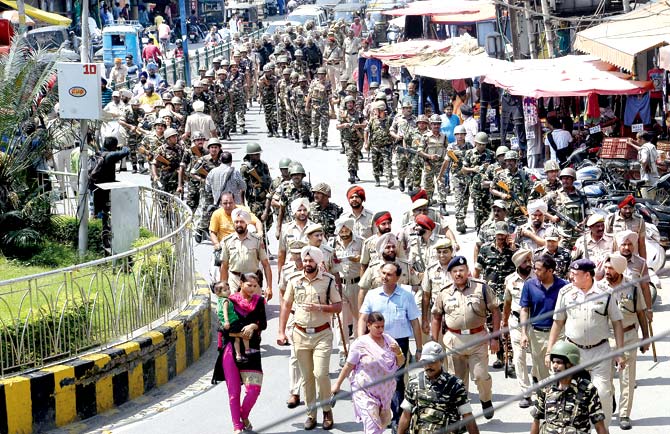The apex court's privacy verdict is a major roadblock for the BJP, and will ensure that we are that much farther from a dystopian India


Security forces march through Jalandhar, Punjab, on Saturday. The HC pulled up the government in Haryana and at the Centre for failure to stop ensure law and order after the rape conviction of godman Gurmeet Ram Rahim Singh. Pic/AFP
 A most devastating derailment happened last week to the BJP's project of imposing its own idea of uniformity on India, when a nine-member bench of the Supreme Court unanimously declared privacy to be a fundamental right. Prime Minister Narendra Modi, BJP chief Amit Shah and RSS boss Mohan Bhagwat all found their throats parched dry by one profound idea: The individual. I think, therefore I am. I alone decide my destiny. I am responsible for my actions. How meaningfully I participate in society is my choice. Community is not absolute but forever calibrated. The State is at my service, and never the other way around. These axioms define what it is to be a human being. They define what it means to be alive. They define dignity.
A most devastating derailment happened last week to the BJP's project of imposing its own idea of uniformity on India, when a nine-member bench of the Supreme Court unanimously declared privacy to be a fundamental right. Prime Minister Narendra Modi, BJP chief Amit Shah and RSS boss Mohan Bhagwat all found their throats parched dry by one profound idea: The individual. I think, therefore I am. I alone decide my destiny. I am responsible for my actions. How meaningfully I participate in society is my choice. Community is not absolute but forever calibrated. The State is at my service, and never the other way around. These axioms define what it is to be a human being. They define what it means to be alive. They define dignity.
ADVERTISEMENT
When French philosopher Rene Descartes posed Cogito, ergo sum, he argued that the mere fact of thought was proof enough to establish the existence of the thinker. From thought flows agency. Thus, to control our thoughts, the State attempts to become not just the means of an individual's existence, but also the ends to which individuals exist.
George Orwell's 1948 dystopian novel, Nineteen Eighty-Four, illustrates the extreme case of no privacy. The characters have no way to express their own doubts and curiosities, because even when they're at home, sitting on their beds, 'Big Brother' is watching them. Of course, one of the ironies of Nineteen Eighty-Four is that the surveillance state becomes an end in itself, with citizens like protagonist Winston Smith in its service. A wayward facial expression can give a person away as an enemy of the State; keeping a diary is tantamount to self-incrimination; sexuality is only for procreation, not expression.
Many have fretted, not unreasonably, that the trend around the world nowadays is towards totalitarianism. The world has stopped getting richer and times are uncertain; riding this wave of insecurity a bunch of demagogues have attained power. "We're doers, not thinkers," is a common refrain, as if that were a badge of honour. One society where this attitude is fashionable is India: Where good times have been promised, where intellectuals are derided, where sexuality is either procreational or deviant, and where even a memoir can be anti-national.
For three years it looked as if Modi, Shah, Bhagwat et al, were getting their way unimpeded. If anything, the political opposition's reaction more often than not was something to the effect of "I'm no less Hindu or patriotic than them". It looked as if Modi and team would have an easy walkover in 2019 and ensure a continuation of their project of 'fixing' India - even if their idea of India suffers from Obsessive-Compulsive Disorder. It looked as if we would be resigned to becoming walking slabs of meat, labelled with a 12-digit number, injected with the preservative known as the opiate of the masses. It looked as if India would have to give up its tight embrace of German philosopher GW Leibniz's phrase unitas in varetite, or 'unity in diversity'.
Until the Supreme Court stepped in. Its judgment is a wall in the elaborate roadmap laid out by Modi, Shah, Bhagwat et al. Even their favoured argument that privacy was an elitist concern and that the poor needed economic security before privacy (this is a variant of their periodic anti-corruption plank), was tossed aside by the Court. Modi and team quietly licked their wounds this weekend. They were also distracted by the rape conviction of another of their godmen. Modi's hand-picked Haryana chief minister once again displayed incompetence in discharging the state's basic duty, maintaining law and order — and there were no Muslims or intellectuals to blame for it. However, it is not Modi's style to admit error or course-correct; and true enough, word came that his buddy the CM was staying put.
Recently I have been watching two American TV serials: The Handmaid's Tale and Westworld. In the first, America is taken over by a religious theonomy where women are used as procreation slaves. It's not an exaggeration to say that our Hindutva brigade would consider this utopian rather than dystopian. (I've seen guys on Twitter assert that marital rape is their right, not a crime. The Court will decide this week.) The second, an adaptation of a 1973 film, is set in a resort populated by robots to grant the visitor an American frontier experience. The robots would like autonomy, but their thoughts and movements are monitored and controlled, centrally. Like Aadhaar. Modi and team would see this again as utopian: In their effort to 'fix' India they prefer that we become robots; or perhaps middle-class robots and underclass sheep. Call me optimistic, but the Court judgment will outlive Modi, Yogi Adityanath and the like-minded. It will go a long way in preventing an Indian dystopia.
Aditya Sinha's crime novel, The CEO Who Lost His Head, is available now. He tweets @autumnshade. Send your feedback to mailbag@mid-day.com
 Subscribe today by clicking the link and stay updated with the latest news!" Click here!
Subscribe today by clicking the link and stay updated with the latest news!" Click here!







